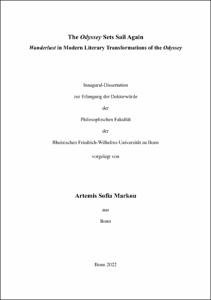Markou, Artemis Sofia: The Odyssey Sets Sail Again : Wanderlust in Modern Literary Transformations of the Odyssey. - Bonn, 2022. - Dissertation, Rheinische Friedrich-Wilhelms-Universität Bonn.
Online-Ausgabe in bonndoc: https://nbn-resolving.org/urn:nbn:de:hbz:5-67935
Online-Ausgabe in bonndoc: https://nbn-resolving.org/urn:nbn:de:hbz:5-67935
@phdthesis{handle:20.500.11811/10247,
urn: https://nbn-resolving.org/urn:nbn:de:hbz:5-67935,
author = {{Artemis Sofia Markou}},
title = {The Odyssey Sets Sail Again : Wanderlust in Modern Literary Transformations of the Odyssey},
school = {Rheinische Friedrich-Wilhelms-Universität Bonn},
year = 2022,
month = sep,
note = {The present study examines the motif of Wanderlust in modern literary transformations of the Homeric Odyssey from the nineteenth century to the present day. It poses the question of how the examined texts present the Homeric hero, and how these transformations signify cultural change. Furthermore, it explores how the tendency to see Odysseus as an incurable wanderer reflects contemporary issues such as migration or the constantly changing meaning of home and what this implies for the confrontation with the Other. As a contribution to the field of the history of ideas and classical reception studies, this doctoral thesis offers a comparative approach to modern transformations of the Odyssey from six different languages (English, Modern Greek, Italian, German, Spanish and French), ranging from Tennyson’s poem Ulysses (1833) to Karla Suárez’s novel La viajera (2005). The way in which the myth is reworked through time not only sheds light on an old story, but also hints at an actual cultural change in the eras in which these transformations are produced. Wanderlust, here denoting a psychological disposition of inner unrest, thus emerges as a specific characteristic of a modern Odysseus. For, many uncertainties and anxieties of human existence are addressed in modern times with recourse to the eternal wanderer Odysseus, as a result of which the hero manifests himself as a deeply modern character and phenomenon. However, the analysis of the Homeric text at the beginning of the study reveals that this aspect of existential Wanderlust is not a completely post-Homeric invention, but arises from the cunning hero's thirst for knowledge and discovery, which, in addition to his longing for Ithaca, was characteristic of him from the very beginning. After Dante Alighieri, many centuries later, elevated this aspect of the Homeric hero to his very central feature, by having him appear in the Inferno of his Divina Commedia (Inferno XXVI, 52142), it developed into a literary topos that came to dominate the reception of the Odysseus myth in Europe from the nineteenth century onwards, and is now to be found, appropriately, on a truly global scale.},
url = {https://hdl.handle.net/20.500.11811/10247}
}
urn: https://nbn-resolving.org/urn:nbn:de:hbz:5-67935,
author = {{Artemis Sofia Markou}},
title = {The Odyssey Sets Sail Again : Wanderlust in Modern Literary Transformations of the Odyssey},
school = {Rheinische Friedrich-Wilhelms-Universität Bonn},
year = 2022,
month = sep,
note = {The present study examines the motif of Wanderlust in modern literary transformations of the Homeric Odyssey from the nineteenth century to the present day. It poses the question of how the examined texts present the Homeric hero, and how these transformations signify cultural change. Furthermore, it explores how the tendency to see Odysseus as an incurable wanderer reflects contemporary issues such as migration or the constantly changing meaning of home and what this implies for the confrontation with the Other. As a contribution to the field of the history of ideas and classical reception studies, this doctoral thesis offers a comparative approach to modern transformations of the Odyssey from six different languages (English, Modern Greek, Italian, German, Spanish and French), ranging from Tennyson’s poem Ulysses (1833) to Karla Suárez’s novel La viajera (2005). The way in which the myth is reworked through time not only sheds light on an old story, but also hints at an actual cultural change in the eras in which these transformations are produced. Wanderlust, here denoting a psychological disposition of inner unrest, thus emerges as a specific characteristic of a modern Odysseus. For, many uncertainties and anxieties of human existence are addressed in modern times with recourse to the eternal wanderer Odysseus, as a result of which the hero manifests himself as a deeply modern character and phenomenon. However, the analysis of the Homeric text at the beginning of the study reveals that this aspect of existential Wanderlust is not a completely post-Homeric invention, but arises from the cunning hero's thirst for knowledge and discovery, which, in addition to his longing for Ithaca, was characteristic of him from the very beginning. After Dante Alighieri, many centuries later, elevated this aspect of the Homeric hero to his very central feature, by having him appear in the Inferno of his Divina Commedia (Inferno XXVI, 52142), it developed into a literary topos that came to dominate the reception of the Odysseus myth in Europe from the nineteenth century onwards, and is now to be found, appropriately, on a truly global scale.},
url = {https://hdl.handle.net/20.500.11811/10247}
}






